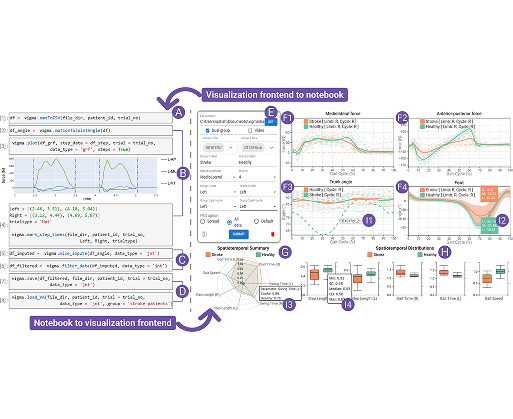VIGMA: An Open-Access Framework for Visual Gait and Motion Analytics

Key Contributions:
- Developed VIGMA, an open-access visual analytics framework for motion analysis.
- Demonstrated support for multivariate gait data—kinetic, kinematic, and spatiotemporal parameters—using 120+ trials from healthy and stroke patients collected at baseline and 6-month follow-up.
- Validated the system with 5 domain experts from 3 research labs and 1 clinic, achieving 4–5/5 usefulness ratings and demonstrating improvements in error correction, disease tracking, and group comparison.
Abstract
Gait disorders are commonly observed among older adults, who frequently experience various issues related to walking. Additionally, researchers and clinicians extensively investigate mobility related to gait in normally and abnormally developing children, athletes, and individuals with orthopedic and neurological disorders. Effective gait analysis enables us to understand the causal mechanisms of mobility and balance control of patients, develop tailored treatment plans to improve mobility, reduce fall risks, and track rehabilitation progress. However, analyzing gait data is a complex task due to the multivariate nature of the data, the large volume of information to be interpreted, and the technical skills required. Existing tools for gait analysis are often limited to specific patient groups (e.g., cerebral palsy), only handle a specific subset of tasks in the entire workflow, and are not openly accessible. To address these shortcomings, we conducted a requirements assessment with gait practitioners (e.g., researchers, clinicians) via survey methods and identified key components of the workflow including (1) data processing and (2) data analysis and visualization. Based on the findings, we designed VIGMA, an open-access visual analytics framework integrated with computational notebooks and a Python library, to meet the identified requirements. Notably, the framework supports analytical capabilities of disease progression and comparisons between multiple patient groups, which are lacking in existing tools. We validated the work through three usage scenarios with experts specializing in gait and mobility rehabilitation. VIGMA is available at github.com/komar41/VIGMA.
GitHub repo:
References
-
 VIGMA: An Open-Access Framework for Visual Gait and Motion AnalyticsIEEE Transactions on Visualization and Computer Graphics, 2025
VIGMA: An Open-Access Framework for Visual Gait and Motion AnalyticsIEEE Transactions on Visualization and Computer Graphics, 2025